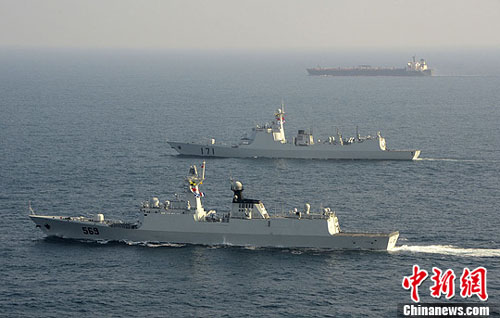
Chinese naval vessels in escort mission (file photo)
"China should send more submarines to the Indian Ocean to make concerned countries get used to their presence in that region," said Hu Bo, researcher with Peking University Ocean Strategy Research Center.
According to Indian English-language fortnightly news magazine, India Today, a Chinese attack submarine was deployed in the Indian Ocean for two months in late 2013. And another conventional power submarine appeared in the region in September 2014.
In response, China's Ministry of National Defense said the two vessels were deployed to conduct anti-piracy patrols in the Gulf of Aden.
Since 2008, Chinese vessels have increased their escort missions in the Gulf of Aden, said Li Jie, a naval expert. He added that it was reasonable for nuclear and conventional power submarines to participate in such missions given that they are China's main battle vessels.
The Times of India reported that a total of 12 to 14 Chinese vessels appeared in high seas in the Indian Ocean in the past 2 months; meanwhile there were only 3 to 4 several years ago. In addition, 7 nuke submarines have entered the region so far, the paper said.
The ongoing 2017 Malabar naval exercise involving the U.S., Japan and India is drawing to a close, with more than 100 aircraft and 21 vessels participating in the drill.
Officials from the three countries all claimed in public that the objective of the drill was to cooperate on humanitarian aid and anti-piracy missions. However, India Today said that the drill was indeed a strategic message to China.
"Taking China as the imaginary enemy is a reflection of Cold War mentality," Hu said, adding that the ocean is a global public product that does not come within the jurisdiction of any single country.
Zhao Gancheng, director of South Asia Studies with Shanghai Institute for International Studies, told thepaper.cn that extension of military power was only a natural step taken by China to protect its national interests.
The geo-strategic position of the Indian Ocean has a profound influence on China's national security and development, Zhao said, adding that sending vessels to the region was normal for the country.


















































